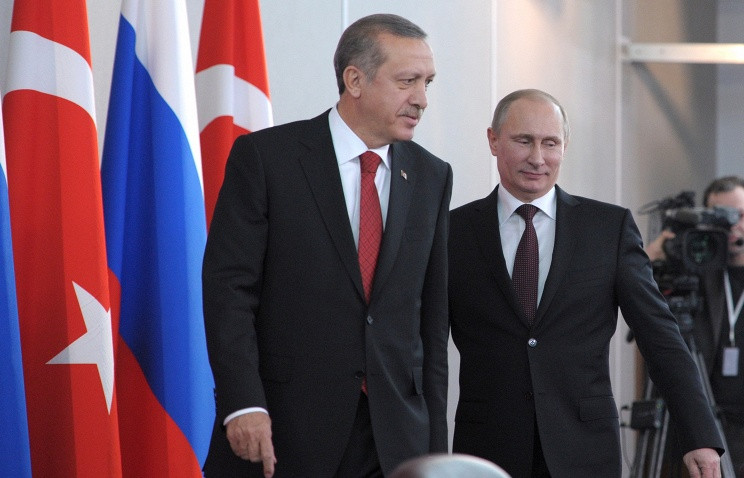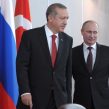
Erdogan and Putin Meet in Baku: Will the Balance of Power Change in the South Caucasus?
Publication: Eurasia Daily Monitor Volume: 12 Issue: 119
By:

After years of preparations, Azerbaijan is hosting the first ever European Games, which kicked off on June 12 and will end on June 28. Besides being a high-profile international sporting event, the Games also serve as an important symbol for Azerbaijan to prove its ties to the European community of states (Cbc.az, May 26).
The opening ceremony of the European Games attracted tens of thousands of live spectators to the Olympic Stadium in Baku, as well as a number of international leaders, including Recep Tayyip Erdoğan and Vladimir Putin, the presidents of Turkey and Russia—the two biggest geopolitical players in the Caucasus region. In addition to watching the ceremony, the two heads of state held talks in Baku on regional cooperation (Yeni Musavat, May 10). Reportedly, the Turkish and Russian presidents discussed the future of energy cooperation between the two countries, and in particular the development of the proposed Turkish Stream natural gas pipeline project. The two sides also discussed suggestions for preparing a roadmap on achieving consensus over the issue of the Syrian civil war, as well as the recent report prepared by the Turkish Foreign Ministry addressing the widespread Russian maltreatment of the Crimean Tatars, which was presented to Putin. Finally, Putin and Erdoğan also raised the topic of the Karabakh conflict (T24, May 13). The chosen location for Putin and Erdoğan’s meeting—the Azerbaijani capital of Baku—is noteworthy and strongly suggests the growth of potential trilateral cooperation in the South Caucasus among Russia, Turkey and Azerbaijan.
According to the Russian daily Kommersant, prior to their meeting in Baku, relations between Turkey’s President Erdoğan and Russian President Putin were incredibly strained as of late (Kommersant, May 15). Dr. Togrul Ismayıl, a Eurasian expert at the Ankara-based TOBB University of Economics and Technology, noted: “Turkey’s report on the violations of human rights in Crimea, which was prepared by Ankara, causes tensions in the bilateral relationship,” and as he pointed out, “these tensions began after Putin visited Armenia [to commemorate] the 100th anniversary of the Armenian genocide” (Author’s interview, June 15). Yet, despite these difficulties in bilateral relations, the presidents of Turkey and Russia still met face to face.
The Turkish-Russian relationship encourages close scrutiny because of its potential effect on the regional blocs that have grown up in the South Caucasus since the end of the Cold War. In particular, Turkish and Russian joint support for Azerbaijan’s Foreign Policy in the South Caucasus may affect the resilience of the pre-existing security-focused geopolitical triangle of Ankara, Baku and Tbilisi (see EDM, March 11, 2014). Formed, to some degree, in opposition to the geopolitical grouping of Russia, Armenia and Iran, the Turkish-Azerbaijani-Georgian trilateral partnership has been engaged in security and economic integration, and its interests have heretofore been more closely aligned with the Euro-Atlantic community than with Moscow’s policies in the region.
TOBB University’s Dr. Ismayıl commented that, for now, the two rival regional blocs are mostly tolerating each other, sometimes turning a blind eye to their many political conflicts or simply keeping silent while considering their mutual economic interests. And although the growing potential for cooperation among Moscow, Ankara and Baku “is perceived as a positive signal, it is not a substitute for Turkey, Georgia and Azerbaijan’s [trilateral] cooperation, at the moment,” Ismayıl asserts (Author’s interview, June 15).
Officially, Russia appears to have a somewhat different point of view on this issue, as illustrated by remarks made by Tural Kerimov, the editor-in-chief of Sputnik Türkiye—the Turkish-language service of the Russian multimedia news agency financed and run by the Kremlin. Kerimov describes the growing developments of Turkish-Russian-Azerbaijani relations as follows: “The policy of the Russian Federation shows that the period of geopolitical triangles is over. The world is moving toward ‘multipolarity’; and stability, economic cooperation and development will be established solely by taking into account [all countries’] interests.” According to the Turkish Sputnik editor, Russia is particularly keen on developing bilateral relations with Azerbaijan, Georgia and Armenia, in the South Caucasus, with the aim to entirely dispense with regional blocs. Growing cooperation between Turkey and Russia in the South Caucasus will certainly result in a shift in the power balance in this region, he argues. That is, the Turkey-Azerbaijan-Georgia and the Russia-Armenia-Iran triangles will gradually loosen. By acting through its bilateral relations with all these states, Kerimov explains, Russia is keen on continuing its influence in the region by dissolving the regional blocs and preventing them from crystalizing again (Author’s interview, June 14).
Referring to the relations between Turkey and Azerbaijan as well as between Russia and Turkey, Kerimov sees their cooperation developing within the context of larger regional integration efforts: “Two integration projects currently operate in the Eurasian region,” he argued, “These are the Eurasian Economic Union and the Shanghai Cooperation Organization. Russia is open to cooperate within the framework of these projects” (Author’s interview, June 14).
Indeed, the reality of the Moscow-led Eurasian Economic Union is gradually having a stronger influence on Baku’s own foreign policy thinking. Last May, Azerbaijani Foreign Minister Elmar Mammadyarov represented Baku at the European Union’s 2015 Eastern Partnership summit in Riga. Azerbaijan did not sign any meaningful documents with the EU at the summit, and several days later, Foreign Minister Mammadyarov paid a working visit to Moscow (APA, May 23). In the Russian capital, Mammadyarov noted the impossibility for Azerbaijan to sign a Deep and Comprehensive Free Trade Agreement (DCFTA) between Azerbaijan and the EU—which Georgia, Ukraine and Moldova had signed last year. Speaking to Russian reporters, Mammadyarov explained: “Azerbaijan is not satisfied with [the EU’s] Association Agreement [of which the DCFTA would be a part], because we are not a member of the WTO [World Trade Organization], and therefore a free trade zone can’t refer to Azerbaijan” (Report.az, May 26). Turning then to the Eurasia Union, he clearly stated: “Cooperation with the Eurasia Economic Union is possible but not before the resolution of the Azerbaijani-Armenian border, this is, the Nagorno-Karabakh conflict” (Yeni Musavat, May 27).
Mammadyarov’s visit to Moscow was an important expression of Azerbaijani foreign policy, underscoring Baku’s commitment to maintaining “balance” in its foreign relations. Yet, Azerbaijan’s continuing need to prove its multi-vectorism to Moscow, combined with Turkey’s growing willingness to cooperate with Russia on regional issues of concern may leave the Ankara-Baku-Tbilisi trilateral grouping vulnerable to disruption. And this threatens to redistribute the current balance of power within the South Caucasus.




